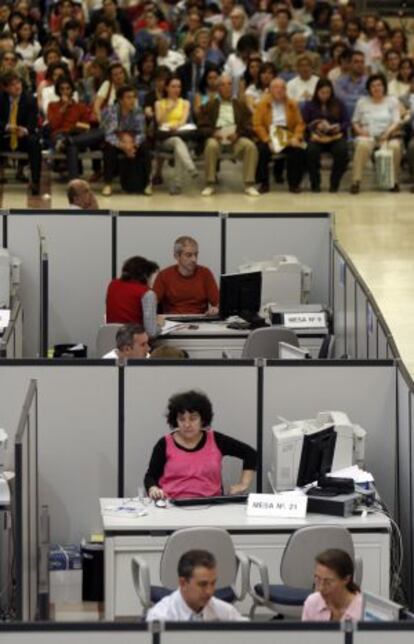Tax inspectors believe collections will fall in the next few years
Agency refuses to extend amnesty deadline for dodgers


"How can my client square up two Picassos that he has abroad?" a tax expert asks, quite openly. This scene occurred last week in a meeting organized by the Spanish Association of Tax Advisors (AEDAF) with officials from the Tax Agency (AETA) to clear up doubts about an amnesty for tax dodgers introduced by the government.
The amnesty offers the holders of black-market money or assets to declare them without prosecution, paying only 10 percent of their value. The government is hoping to take in 2.5 billion euros from the measure, which is in place only until the end of November.
Tax advisors are asking AETA for more time because of what they claim are uncertainties in a process they describe as confusing. Some are having problems dismantling the complex business arrangements they designed to squirrel black-market money away from the prying eyes of the AETA to tax havens overseas. Others have doubts about what part of their clients' income comes under the umbrella of the statute of limitations and what might still be liable for tax.
However, the tax agency has refused to extend the deadline for the amnesty. "If the amnesty is successful, it will be more out of fear of the law against fraud than out of conviction. But you end up doing what the client asks you to do," one participant at the meeting said. The law against fraud came into effect this week.
When the government approved the amnesty it argued that it was necessary to try to balance the books of the public administrations as the specter of massive public deficits arose because of insufficient revenues to cover spending.
Tax revenues have plunged since 2008 and while the government has cut spending, this has been offset by higher outlays on pensions and unemployment benefits.
"The fiscal crisis in Spain is a crisis of revenues," explains José Ignacio Conde-Ruiz, a deputy director of the economic think-tank Fedea. Conde-Ruiz says this needs to be addressed by means of a "radical and profound" reform of the tax system. He points to the fact that public revenues have fallen by the equivalent of 6 percent of GDP since 2007, while in the European Union they have been steady. In France, they have increased by 0.8 percentage points, by a full point in Germany and by 0.1 points in Italy.
"There has been a fall in revenues from the real estate sector, an unprecedented drop in corporate tax collections and an increase in tax fraud," says Francisco de la Torre, the secretary of the association of tax inspectors (IHE).
While the association is unable to come up with a figure for the scale of the black economy, they have asked for more resources to fight against it. Inspectors point out that Spain sets aside 80 percent less than Germany for such efforts, 67 percent less than France and half of what Italy does.
Conde-Ruiz believes that if the size of the black economy were reduced to the level of Spain's neighbors, tax income would increase by 2 percent of GDP, some 20 billion euros.
Fedea proposes that tax relief on such items as private pension plans could increase revenues by some 9.2 billion euros. It also advocates reducing the top personal income tax bracket from 52 percent to 40 percent, arguing that although the state would lose 1 billion euros in revenues, it would attract wealth to Spain in the longer run.
"We're looking at a fall in tax revenues at all levels of the administration," De la Torre says, arguing that a shift in the economic model toward exports and ongoing deleveraging by the private sector will hit revenues.
It was this that prompted the administration to accept the political costs of approving the amnesty, which has only taken in 50 million euros, according to the latest figures from the Tax Agency.
The new law against fraud among other measures limits operations in cash to 2,500 euros and obliges taxpayers to declare assets they hold abroad. The government is also drawing up legislation that will crack down harder on fraud, with jail terms of up to six years.
On the spending side, the government could undertake an overhaul of the structures of the state to cut back on outlays, but that is another story.
Tu suscripción se está usando en otro dispositivo
¿Quieres añadir otro usuario a tu suscripción?
Si continúas leyendo en este dispositivo, no se podrá leer en el otro.
FlechaTu suscripción se está usando en otro dispositivo y solo puedes acceder a EL PAÍS desde un dispositivo a la vez.
Si quieres compartir tu cuenta, cambia tu suscripción a la modalidad Premium, así podrás añadir otro usuario. Cada uno accederá con su propia cuenta de email, lo que os permitirá personalizar vuestra experiencia en EL PAÍS.
¿Tienes una suscripción de empresa? Accede aquí para contratar más cuentas.
En el caso de no saber quién está usando tu cuenta, te recomendamos cambiar tu contraseña aquí.
Si decides continuar compartiendo tu cuenta, este mensaje se mostrará en tu dispositivo y en el de la otra persona que está usando tu cuenta de forma indefinida, afectando a tu experiencia de lectura. Puedes consultar aquí los términos y condiciones de la suscripción digital.








































